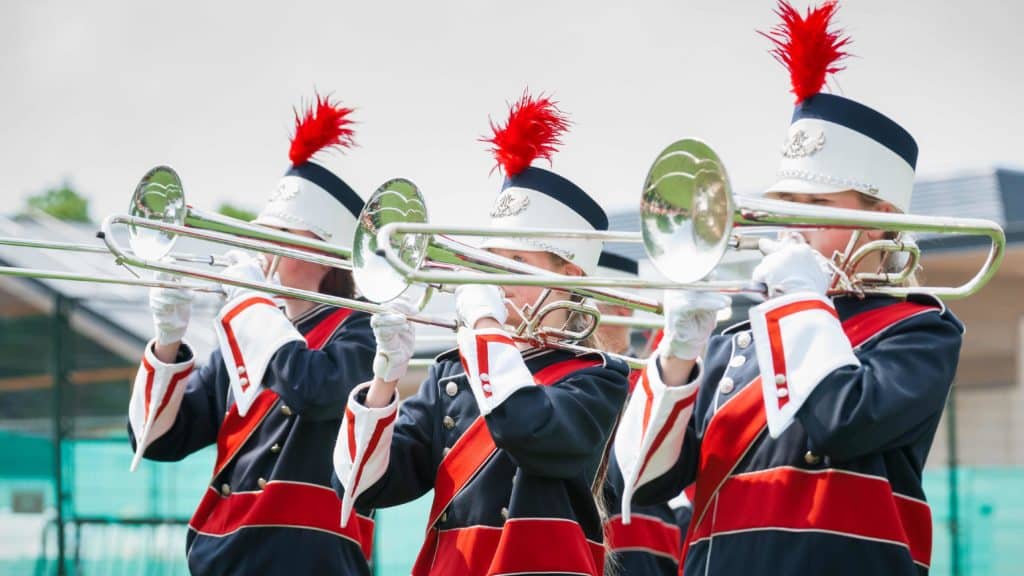
Sometimes they don’t get much respect, these marching band kids.
They get ignored or called names. They are misunderstood. They sometimes get passed by for recognition or funding or accolades.
But let me share some of what I’ve seen the past year.
These kids practice in sweltering heat for hours during the summer with sweat dripping off their faces. They perform in rain and wind and cold. They lug pounds and pounds of instruments (have you ever held a sousaphone or tuba? It’s like 20 or 30 pounds?) and equipment and props from the school to the fields to the bus and back again.
Want to get your 10,000 steps in? They do that in one parade route or practice or sometimes even routine!
They get to school at 7 a.m. to practice before competitions and stay until 10 p.m. for football games. They meet during class and practice at home and stay after school and late into the night.
They look out for each other. They offer rides and snacks and support. They make sure the freshman feel included and the seniors are celebrated because they are all part of one big team.
They are part of something greater than they ever could be by themselves.
And the parents? The parents of these marching band kids are hard-core.
They spend their weekends creating elaborate set designs and fitting uniforms and serving meals for 14-hour days.
Each weekend, I see moms and dads and grandparents and siblings loading U-Haul trucks and handing out waters and cheering in the stands.
Related: Please Don’t Forget About Cheering for the Band On Friday Night Lights
Marching band is often overlooked
A lot of people don’t give marching bands the appreciation they deserve. They don’t take it seriously. They talk over their performances during halftime or maybe even make fun of some of the members.
But marching band is often a place that welcomes everyone. Where the loneliest kids can find their people, where kids who feel different can feel like they belong, where even if you don’t play an instrument, they will find a place for you.
Isn’t that what every kid deserves? Isn’t that what we should be celebrating?
The truth is, I didn’t realize how special it was until I saw it with my own eyes.
Let me tell you something about those kids in marching band….they are performers, they are athletes, they are a team.
They are family.
And we can all learn a little something about how to live life, how to treat each other, how to focus on what’s important, from them.
I’m a proud Marching Band parent. I hope you will support them, too.
Related: Watching My Lonely Teen Navigate High School Breaks My Heart
Why should teens participate in marching band?
If your teen or pre-teen is struggling to find their place, consider encouraging them to check out marching band. There are often many ways kids can participate to foster personal growth and find a sense of community and support. Marching band can also help a teen develop soft skills to help them be more successful in life. Some of the benefits of marching band include:
Studying music makes kids smarter:
Study after study shows that children and teens who study music perform better in school. They get higher grades, have improved literacy, and are 24% more likely to graduate. In fact, students highly engaged in music are, on average, academically over one year ahead of their peers!
Time management:
Marching band is a major time commitment, and participating in it can help students learn how to balance responsibilities. (You may also like to read: Time Management Can Be Tricky for Teens: Here’s How to Help)
Active lifestyle
Marching band is about strength, coordination, and endurance. It promotes a healthy lifestyle and taking care of oneself in order to sustain the long days and performances.
Teamwork
Marching band emphasizes collaboration and teamwork. Students must work together closely to create intricate formations, synchronize movements, and produce a cohesive sound. This experience fosters a sense of unity and teaches valuable interpersonal skills.
Builds self-esteem
As students develop their skills and contribute to the band’s success, they gain self-confidence. Performing in front of an audience helps build self-assurance and stage presence.
Creative Expression:
Marching band often allows students to express themselves creatively. They may have opportunities to arrange music, contribute to choreography, or design visual elements of the performance.
Social skills and bonds
The close-knit nature of marching bands (and how much time they spend together) fosters strong friendships and a sense of belonging. It often helps students learn how to problem solve and get along with others.
Work ethic
Band participants learn the value of practice, persistence, and continuous improvement. They work towards goals. (You might also like to read: 5 Ways To Help Teens Develop A Strong Work Ethic)
High school marching band offers a holistic experience that extends beyond music. It cultivates skills and qualities that benefit students both personally and academically. And it’s just fun for all involved!
Parenting teens and tweens is hard but you don’t have to do it alone. Here are some other helpful posts:
Ten Heartwarming Things I Learned From Volunteering at the High School Concessions Stand
Cross Country Was the Best Part of High School for My Daughter and for Me
I Don’t Want My Kids to Miss Out on High School Trying to Get Into College
Five Parenting Mistakes I Made My Teen’s Freshman Year of High School






As a former Band Parent and now Grandmother to 2 recent high school graduates, who were in the marching band (Color Guard/Winter Guard), I can truly attest to these statements made in this article. Had the best times with our kids, and they and their children too have made lifetime friendships!